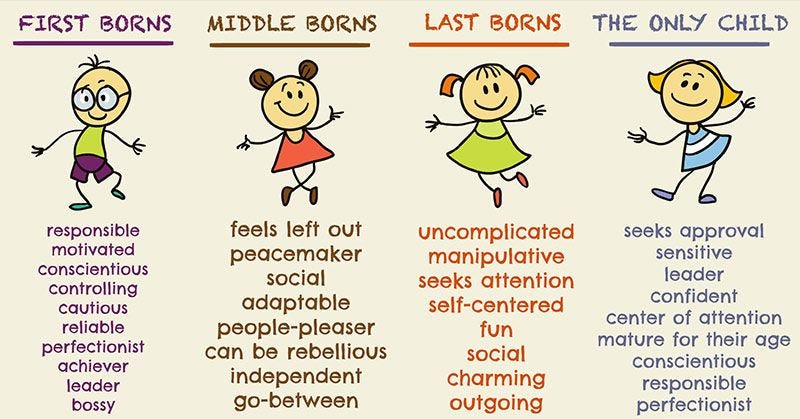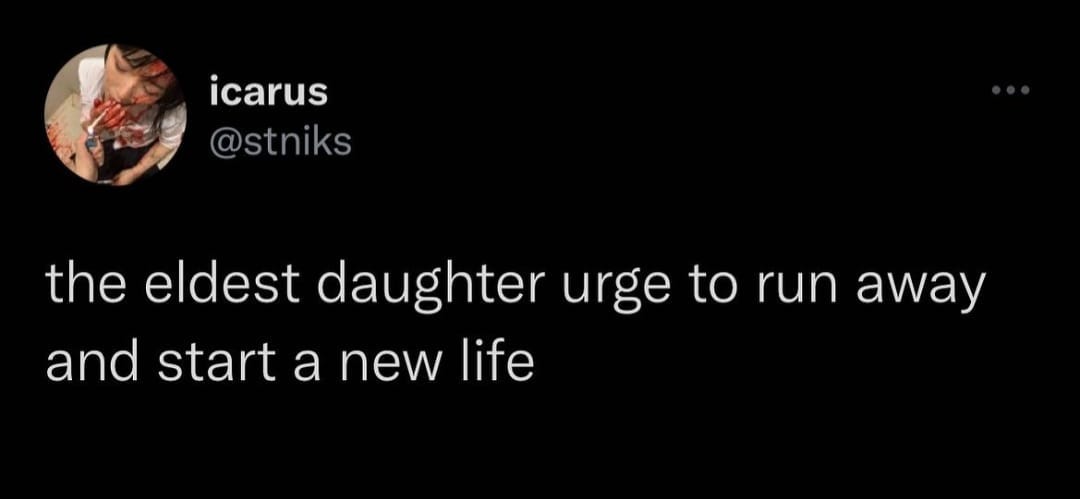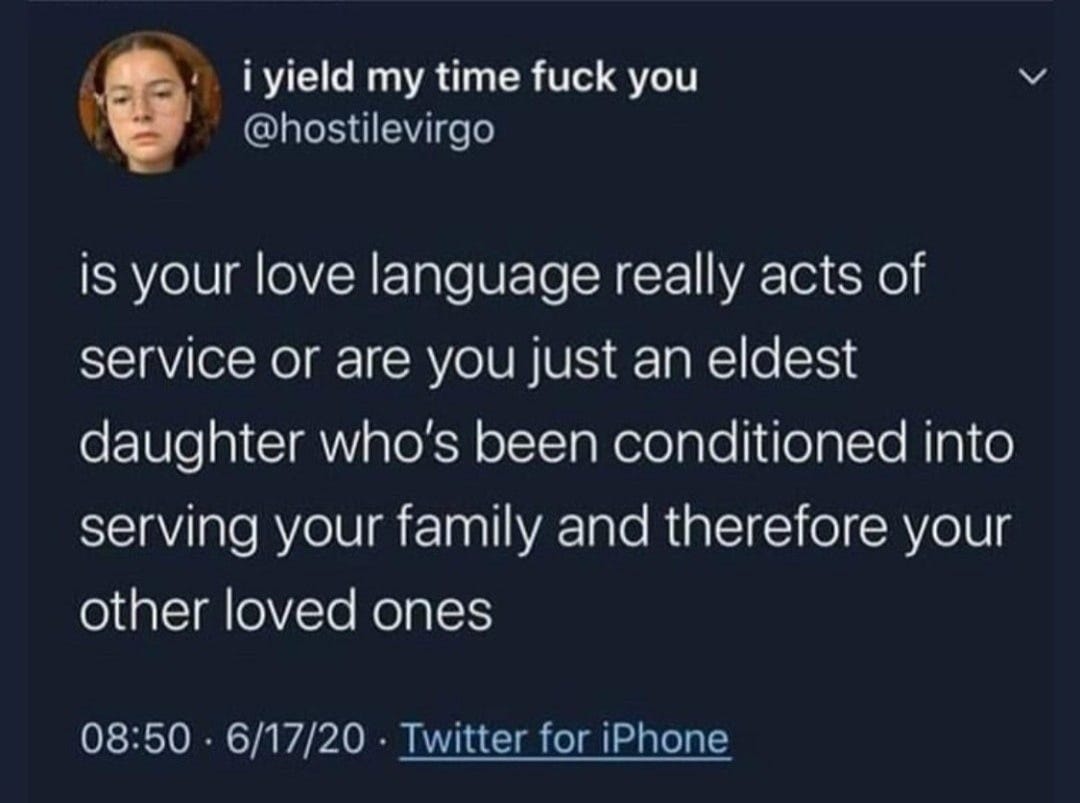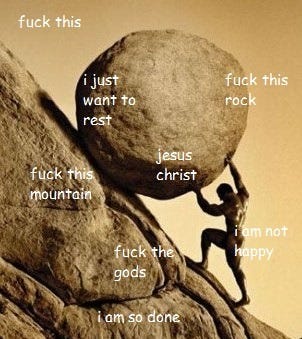003: becoming the third parent
some sentiments on being the eldest daughter of an asian household.
Apart from oddly specific playlists1, I also like making oddly specific movie lists on my Letterboxd in order to figure out what makes me like a movie. So far these are my favorite genres, and any movie that meets any of these standards, I’m pretty sure I will love:
coming of age stories that help me romanticize my life: The Diary of a Teenage Girl (2015), Moonlight (2016), Lady Bird (2017), and Booksmart (2019)
romcoms that make me squeal like a 12 year old One Direction fangirl: 10 Things I Hate About You (1999), Notting Hill (1999), and Love Actually (2003)
psychological thrillers that fire my last two brain cells: Perfect Blue (1997), We Need to Talk About Kevin (2011), and Midsommar (2019)
musicals with soundtracks that significantly improve the storyline: Pink Floyd: The Wall (1982), Across the Universe (2007), Begin Again (2013), and Sing Street (2016)
religious trauma where the protagonist’s faith is questioned: First Reformed (2017), Boy Erased (2018), and Yes, God, Yes (2019)
main character slowly descends into madness: Pink Floyd: The Wall (1982), Black Swan (2010), Birdman (2014), Whiplash (2014), and The Lighthouse (2019)
Some days ago I tried to create a list of movies that depict the eldest child experience since I felt like I needed another film to latch on to apart from Lady Bird lol. There weren’t a lot of movies that fit my initial criteria—coming of age, eldest daughter, Asian—so I expanded it to films that narrate what it’s like being the eldest2, even if the story doesn’t revolve around that struggle entirely.
The only thing that has come out of creating this list is the realization that there is a fine line between the depiction of eldest children in family movies and the narrative of how much parents try their best to be parents with whatever they have, since that’s one of the many roles eldest children are usually expected to fill anyway.
the family constellation
I genuinely believe that anyone who has ever established themselves in the field of psychology is a bit crazy, psychoanalysts especially. If you know me personally, you are probably aware of the fact that I have this burning hatred for Sigmund Freud, the father of psychoanalysis. I do not care what you say and it does not matter to me how much he has contributed to the discipline—that man is crazy to me and I would challenge him to a duel if I could.
But I have to admit, what I love about Freud’s clout-chasing behavior is that his poorly-worded theory about childhood and parent-child relationships led to more people disagreeing with him, which then expanded the world of personality psychology. People were so pressed about how he viewed the human personality—it was almost incel-like3 but he always managed to sound eloquent—so they created their own. Carl Jung4, Alfred Adler, and Erich Fromm5 are some of the people who had the guts to refute the charismatic Freud, and you will hear more about them here soon.
Allow me to gush about Adler, one of my biases in the world of neo-psychoanalysis.
Contrary to Freud whose theory was fatalistic, Adler was brimming with hope. His theory—fondly called individual psychology—is the complete opposite of Freud’s psychoanalysis, insisting that we are not doomed. To Freud, the psychologically fit individual knows how to navigate their ego by striking a balance between the lustful desires of the id and rigid, moralistic principles of the superego; there is no care or regard for others. To Adler, the responsibility of staying sane goes beyond your own world, and the psychologically healthy individual must strive for the success of all over superiority of the self.6
I could go on about how much better Adler’s theory fares, but I’d like to focus on one of the overlooked points of his theory: the concept of birth order. This falls under his idea of the family constellation, where he believes that our environment at home—not just our primary caregiver—heavily influences who we are and who we become. According to him, the order in which you were born provides you with certain traits that may not be present in others. Getting to know who we are, at least based on this perspective, requires that we look at how we relate to our family members. What is expected of us? What roles do we take on?
Some may argue that this only holds true to some extent, as there are traits associated with each child that is not always the case, but if you think about it, all other theories are just as fallible (hot take: psychology is just socially acceptable astrology because a lot of these concepts taught to us hail from the West7).
As I learn more about myself and uncover the dark, repressed parts of my identity, I am beginning to realize how much being the eldest has affected the way I function. I’ve always taken pride in being the firstborn, paving the way for my sister, setting the bar for her to surpass, and hopefully making things easier for her. It helps that I have a good relationship with her, because then we are able to alternate between being the eldest and the youngest when one feels too overwhelmed with responsibility (in the recent years this has been me).
the panganay experience
Earlier this year, I joined this support group for eldest daughters. I think this started because there were tweets going around about certain struggles that mostly eldest daughters can relate to, such as being the third parent, reluctantly taking on the role of the breadwinner, shouldering all other responsibilities at home (basically any other way of losing your youth to growing up too quickly) to name a few.
I’m not saying these experiences are limited to eldest daughters, because there are times where the family dynamic is so different that others carry the burden of keeping the family together. For the sake of this post, I will refer to these instances as part of the panganay experience, which I define as being expected to grow up too early and too fast because responsibilities can no longer wait for you, making you forget a little too quickly what it’s like to be a child.
Though I hate to admit it, becoming aware of how my birth order shaped my lifestyle and decision making process has brewed some resentment in me. I know that my situation ever since wasn’t my parents’ fault entirely. I mean, sure, they could have just used condoms and decided to be child-free their whole lives (which is something I have decided for myself now thanks to being the eldest). That would have saved us all from a lot of trouble, really. But because of Catholicism’s demand for married couples to procreate, our tight-knit collectivist culture, the Filipino concept of hiya that childless married couples in their late 30s are often made to feel, I now exist with over 20 years’ worth of trauma and the burden of unpacking all of this: growing up too fast, handling too many responsibilities, and being the glue that keeps it all together.
Like I said, some resentment.
I’m trying to quit holding grudges now that I’m more self-aware. It hasn’t done me good, being resentful, but after a conversation with a good friend about another problem I had recently, he told me that sometimes resentment is needed, that the space it takes up is necessary to feel better. Sometimes, people do things that deserve your hostility, and it’s okay to feel that way no matter how much love you have for them. I was too caught up defending the situation I was in that I didn’t ask for him to explain that, but it had me thinking about how I tend to let my feelings slide because I don’t want to hurt or disappoint anyone since I’m used to attending to other people’s needs first.
When you’re young, this kind of selflessness seems beautiful. Putting people first and caring about others enough to tell them that it is safe here, these are how relationships flourish. But the problem with being the eldest is that this selflessness is always expected and exploited, even when you have nothing left to give. Try to leave some for yourself, and they resent you, so you end up being a people-pleaser with a savior complex and abandonment issues, seeking what could make others like you more, proving to them how useful you are, and wanting to save people from their misery because you were taught that that’s how you make people stay. Somehow your worth becomes so intertwined with what you are capable of giving and sacrificing to make others happy that you have no idea who you are on your own.
I try not to imagine what life would be like for me if I weren’t the eldest, because I know that I would just end up feeling a lot more bitter than I already do. But I do have moments spent daydreaming how much different—better?—things would have been: how much money I would have saved by now if I wasn’t my family’s breadwinner, how much I would have been able to travel if I didn’t have to constantly worry about not being able to maintain peace or referee a new family fight, and how much more freedom I would have experienced if I wasn’t so tied down by the need to be there for those I’m bound to by blood. I know I’d make it to the top much faster without having this boulder to push.
But as Camus puts it, one must imagine Sisyphus happy.
This isn’t to say that I just have to romanticize being needed by others, or that I should be thankful that I hold a ton of significance in my household and without me their world would be in shambles. Doing so would just reinforce the comfort zone that I need to get out of if I would like to overcome maybe 80% of my issues. Instead, there has to be an acceptance of how things are and figuring out how to change with what you have, which is the hard part. At times I still feel helpless, as if things are meant to stay this way forever, but a little part of me is delusional enough that all this hardship will one day make sense and probably be worth every tear (I honestly doubt it but like I said, delusional8).
*NEW* today’s takeout
I am still in the process of creating structure in this newsletter because I’m trying to commit to my hobbies better (or maybe because my north node is in Virgo lol). This section won’t always be here as this will contain the little nuggets of wisdom that I get from my therapist herself, which doesn’t always happen as much as I’d like since I do talk therapy with her (and that means I do most of the talking).
In my first session, I tried to neatly address all my issues through a presentation but looking back, it felt like a word vomit. I’m glad that my therapist was attentive enough because she was able to follow anyway. I expected her to address the pressing concerns I had, such as my neuroticism, but she caught me off guard by telling me that I have to be aware of the pressure that I put on myself. I already have so much on my plate that pushing myself to work harder and do better is counterproductive. I was confused, because isn’t that how we grow? She told me that I have to look at where I am and work with what I have. She also pointed out how much of a perfectionist I can get, very rigid in my ways and hard on myself when things don’t go as planned.
Therapy has been weird because each session reminds me to put myself first. As an eldest daughter, this feels odd, out of character even. But if I would like to get better, my therapist told me, I need to learn where to draw the line and look beyond my place in our family constellation as that is only one part of who I am. “You can care for them [your family], but you don’t have to put up with their issues,” she said one time.
I’m not sure if it’s the remaining Catholic guilt or the stubbornness as a Taurus, but learning to be selfish is hard. I’ve hurt people in the process of changing for the better, which feels awful and discouraging until you realize that at times, the pain comes from people’s inability to accept the boundaries you’re learning to set in order to protect yourself. As I try to do better, I realize that I do not know how to describe who I am beyond my panganay responsiblities. It’s both terrifying and exciting. On one hand, I have little to no idea who I am; on the other, there’s a lot of good possibilities waiting to be realized, and Olivia Gatwood said it best: I have so much beautiful time.9
journal prompts
Always optional, but this section is to help you reflect on your own experiences better since this is what is done in therapy anyway. Feel free to answer these questions in your notebook or comment them here. I’d love to read your answers only if you’re comfortable sharing!
Which fictional characters make you feel seen? What part of their struggle hits home for you?
How important is family to you? How much importance do they require you to give? Do you think it is fair?
If you have siblings, what’s your dynamic like? Who relies on who more, and is this reciprocated by the other? How does this affect the way you interact with them and others?
What do you need in order to have a good (or better) relationship with your family? What does each member have to change in order to achieve this?
I linked the Facebook group instead of my spotify profile because this is one of my favorite online communities. If you’re interested in the music that I listen to, here’s my spotify where I have playlists for almost every mood that I have.
All movies listed feature an eldest daughter except The Florida Project (2017), a story that follows a single mother and her young, troublemaker daughter. I think it’s very similar to the responsibilities passed on to the third parent, and how it feels. If you have recommendations, please comment them! I would love to expand this list.
Freud once referred to women as the ‘dark continent of psychology’. Much of his work is heavily misogynistic, but later on he would admit to not understanding women at all. In Ernest Jones’ The Life and Work of Sigmund Freud, he says, “The great question that has never been answered, and which I have not yet been able to answer, despite my thirty years of research into the feminine soul, is 'What does a woman want?'” Dumbass.
Did you know that Carl Jung, a psychoanalyst, was into astrology? You can read some of his excerpts about the field here. Follow me for more secrets mainstream psychology doesn’t want you to know!
Fromm’s theory, humanistic psychoanalysis, is one of my favorite personality theories. I highly recommend The Art of Loving.
My favorite difference between these two proponents is that Freud had a submissive wife who never questioned his eccentricities, whereas Adler had a feminist wife who was deeply involved in politics and his work.
I can go on about how colonialism has tainted psychology and bastardized indigenous practices that try to explain human behavior. Trust me, I believe in science, but I also make space for spirituality even if I’m not entirely sure what I feel about it. Many of us, myself included, fear what is beyond our comprehension.
Technically delusions are one symptom of schizophrenia, but the context begs the question: should delusions be concerning when it helps you cope and it works well? I shall ask my therapist next time.
This line is from one of my favorite spoken word poems called Alternate Universe.






aaaah, i feel so seen. recently subscribed to your substack (and created mine) because of your tweet!
have u watched reply 1988? :) i love that show so much for a lot of reasons but especially bc of one character: sung bo ra. for me, she’s the perfect representation of being the “eldest daughter in an asian household”! ilang beses akong naiyak sa kaniya sa pagka-relatable niya hahaha. i highly suggest it po, if u haven’t seen it yet
thank u for writing this po! 🥺 been struggling as an ate again lately and glad i read something i could relate to